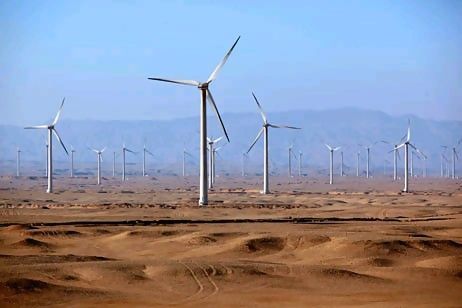The vista in the central province of Minya is as empty as far as the eye can see except for rows and rows of solar panels and the blue sky above.
The panels are helping Amr al- Saad’s 8-month-old power station address the worsening issue of brownouts and blackouts in the area.
“A few years ago, power supply was intermittent, which made the life of the residents of the province very tough,” he said. “That is why I decided to establish my project where it is most needed.”
After generating electricity, Saad’s station feeds it into the national grid where it is used to power houses, farms and workshops in Minya’s villages.
Saad’s project, which cost $100,000 and produces 650 kilowatts of electricity each month, is part of a national drive to reduce Egypt’s dependence on fossil fuels by shifting to renewable energy. Egypt plans to produce 20% of its electricity from renewable sources by 2022 and 37% by 2035. It is an ambitious plan given that just 3% of electricity produced annually in Egypt today is from renewable sources.
The Egyptian government is investing billions of dollars into new renewable energy projects and looking to establish wind farms and solar power plants in around the country.
Several projects are slated for the Western Desert, on the northern coast and near the Suez Canal, where tens of thousands of wind turbines and solar panels dot the once-empty desert.
“Utilising renewable energy is part of a national plan to diversify electricity generation sources to meet growing demand and secure the continuity of the electricity supply,” said Ayman Hamza, spokesman for the Ministry of Electricity. “Egypt has a great, untapped potential to turn into an international renewable energy hub.”
Egypt’s climate gives it massive wind and solar energy potential. The North African country experiences high sunshine duration of from 3,300 hours a year in the north to 4,000 hours in the interior. Egypt’s coastal zones have high wind energy potential, particularly along the Red Sea coast, which experiences average wind speeds of 7-12 metres per second.
“Exploiting renewable energy isn’t a matter of choice for this country,” said renewable energy expert Wael el-Nashar. “Fossil fuels will start running out in a matter of a decade or two, which means that we should start dependence on renewable sources today, not tomorrow.”
Egypt is part of the “sun belt”, which includes the rest of North Africa and the Arabian Peninsula, Nashar said. This geographic position means Egypt can become a major solar energy producer.
Renewable energy projects are getting state support, easy and long-term loans from banks and a long list of clients, including government agencies, ready to buy the electricity produced.
The government is considering a mechanism to allow the feed-in tariff (the price of electricity fed into the national grid) to rise when the price of electricity produced from fossil fuel rises. The Electricity Ministry said the aim would be to ensure that renewable energy producers can profit from their projects.
Nine government agencies have signed contracts to buy electricity produced by renewable energy plants in different parts of the country.
Incentives in Egypt’s new renewable energy law seek to attract investors, Hamza said.
“One of the incentives is that the government is committed to buying all the electricity produced by renewable energy plants,” Hamza said. “Apart from free plots of land and free infrastructure, the feed-in tariff ensures that investors make enough profits to keep their projects running and ensure expansion.”
The same feed-in tariff is also drawing in a growing number of ordinary Egyptians to participate in the renewable energy field. Some of those living in Cairo and other urban areas are installing solar power plants on their rooftops, producing enough electricity to power their homes. Some sell surpluses of electricity to the national grid.
Saad said he expects to recoup half of his initial investment in his power station in Minya in about four months.
“This means that I will collect my investments in a matter of two years,” Saad said. “This continuous flow of cash will help me expand my project in the future.”
Ahmed Meghid is an Egyptian reporter based in Cairo.


